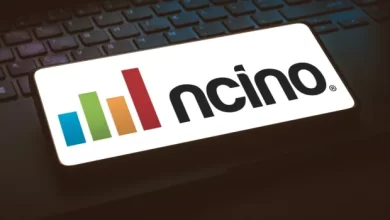Buy Now, Celebrate Later: 3 Fintech Stocks Poised for Growth in Q2

Given that McKinsey predicts the fintech industry could generate over $400 billion in revenue by 2028 — a healthy 15% annual growth rate — investors are keen to buy fintech stocks. Boston Consulting Group’s forecast of fintech’s global financial services revenue reaching $1.5 trillion by 2030 further amplifies the appeal.
In the middle of these projections, the first stock pick we will explore is expanding services to small- and medium-sized enterprises (SME), leveraging artificial intelligence (AI) for growth and rewarding shareholders through aggressive buybacks.
The second company we will look at is more of an upstart. However, its tech-centric, youthful banking model and recent pivot toward profitability set it apart.
A stalwart in the payments industry rounds off this selection. Already an established player in financial services, it is using blockchain effectively to enhance its offerings. At the same time, a 16-year streak of dividend increases and a $25 billion stock repurchase plan will attract most investors looking to buy fintech stocks.
All three stocks are moving forward with a tech-first approach and hold upside at current rates.
PayPal (PYPL)

PayPal (NASDAQ:PYPL) is falling behind other fintechs post-pandemic, with only an 8% increase this year. Yet its valuation at 17x earnings, 45% market share and significant growth potential make it an attractive option among fintech stocks to buy in 2024.
Patience is the key as PayPal navigates a “transition year,” according to CEO Alex Chriss. PayPal forecasted adjusted profits per share for 2024 of $5.10, essentially staying flat year on year.
Positively, though, PayPal’s adjusted fourth-quarter profit came in at $1.48 per share as opposed to the $1.36 per share that analysts had projected. Compared to the projected $7.87 billion, revenue for the quarter increased 9% to $8 billion on a currency-neutral basis thanks to a robust holiday shopping season.
Chriss wants to revitalize PayPal by expanding its services to SMEs and emphasizing high-margin branded checkouts. He also wants to drive PayPal’s development by increasing engagement and conversions via the use of AI and data, which is key to regaining lost market share.
Additionally, PayPal is looking to invest at least another $5 billion in share buybacks on top of the $5 billion spent in 2023. Even in the middle of a transitory period, the payments giant is returning value to stockholders.
PayPal’s AI-driven development and other efforts, such as the PayPal Rewards program and the PayPal Cashback Mastercard, round off the reasons to buy PYPL, one of the best fintech stocks in the field.
SoFi Technologies (SOFI)

Source: Michael Vi / Shutterstock
With its tech-focused approach to banking, recent pivot towards profitability and strategic changes, SoFi (NASDAQ:SOFI) presents itself as a stock with substantial potential.
Thanks to SoFi’s focus on profitability and wide moat, its stock price holds close to a 30% upside potential, based on a $9 per share target price.
The fourth quarter is notable in terms of financial highlights affirming this bullish thesis. SoFi’s fourth-quarter membership increase of 585,000 was 44% greater than levels in 2022. It has also realigned its management staff to further capitalize on the uptick in adoption of its financial products.
In addition, SoFi announced a $34% increase in revenue to $594.25 million, a net income of $47.9 million and its first-ever quarterly profit. These substantial increases in earnings and sales are based on increasing originations of house, student and personal loans.
All of its success, though, leads back to its “super app,” which combines credit cards, investment, cash management, budgeting and education into a single solution to appeal to a younger demographic. Targeting this demo is key since these consumers will represent the bulk of its clientele in the future. Plus, they are two times as likely to choose digital wallets for a smooth banking experience.
With its comprehensive, digitally native banking solution, SoFi distinguishes itself as the “Amazon of Finance,” coming out strong throughout the current banking crisis. Its creative strategy and extensive financial offerings point to a promising future.
Visa (V)

Source: Kikinunchi / Shutterstock.com
Visa (NYSE:V) rounds off this list of fintech stocks to buy. A blue-chip stock with an over 50% share in the card industry, it boasts 4.3 billion cards in circulation worldwide.
Since its IPO, the company’s stock has outpaced the S&P 500 index by a large margin, exhibiting steady and strong growth. It leads the chart with Mastercard (NYSE:MA), having handled a total of 276.3 billion transactions valued at $15 trillion. The two recently struck a resolution to reduce swipe prices. The terms of this $30 billion settlement include a five-year cap on credit card interchange fees. However, Mastercard, with a price-to-earnings (P/E) ratio of 42x, is significantly more expensive than Visa, which trades at 34x.
Shifting gears, Visa also deserves credit for navigating tricky waters post-pandemic, as the cashless economy exploded. The trend will continue, with estimates pointing to a $16.62 trillion market size by 2028. Visa is taking advantage of these secular tailwinds; it continues to outpace growth estimates, reporting four consecutive earnings beats.
Through the Visa Token Service, Visa further extends its reach into the fintech industry, especially in Asia Pacific. This service has improved payment authorizations and reduced fraud.
Visa also aggressively returns capital to stockholders, with 16 years of consecutive dividend increases and a $25 billion stock repurchase plan. This is nothing new for the company, which was previously purchasing stock under a $12 billion buyback authorization.
On the publication date, Faizan Farooque did not have (directly or indirectly) any positions in the securities mentioned in this article. The opinions expressed in this article are those of the writer, subject to the InvestorPlace.com Publishing Guidelines.



